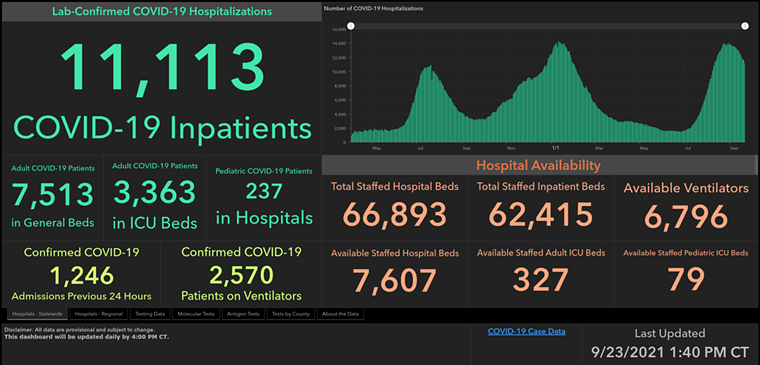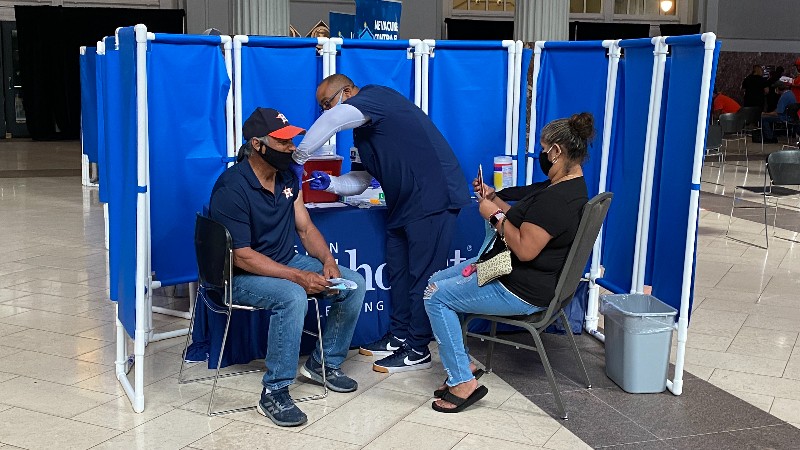As public health experts predicted all along, the quick rise in Texas COVID-19 cases from the summer’s Delta surge has finally been followed by a dramatic uptick in deaths from the virus.
While there are now thousands fewer Texas hospital beds occupied by COVID-19 patients than there were a few short weeks ago, deaths are still climbing, intensive care units remain in low supply across the state and hospitals are still struggling under weight of mostly unvaccinated coronavirus victims.
COVID-19 deaths in Texas have surpassed 62,000 in recent days; about half of those fatalities came after vaccines were first made available late last year, according to the Texas Tribune. The overwhelming majority of Texans dying from the coronavirus are unvaccinated.
Over 5,000 Texas residents died from COVID-19 in September alone. According to a New York Times analysis, approximately 284 Texans are dying every day from COVID-19. That’s fewer than the 377 Floridians losing their lives each day to the virus, but drastically higher than the daily death rates in more-heavily vaccinated states California (117 per day) and New York (35 per day).

Department of State Health Services Data shows statewide COVID hospitalizations are continuing to decline.
Screenshot
Early Friday morning, the director of the U.S. Centers for Disease Control Dr. Rochelle Walensky surprised some of her colleagues by endorsing a wider-ranging, but still limited, authorization plan for COVID-19 booster shots for folks who received Pfizer’s two-shot vaccine.
On Thursday, the CDC’s vaccine advisory panel voted to recommend booster shots for Pfizer recipients 65 and older and for nursing home residents, and to allow booster shots for certain younger people who want an extra dose that have serious health conditions that put them at risk for more serious cases of COVID-19. The panel did not follow the U.S. Food and Drug Administration's recommendation earlier this week that frontline workers in healthcare, education and other industries at high risk for on-the-job COVID-19 exposure should be approved for booster shots.
But in a break with her own agency’s advisory panel, Walensky sided with the FDA and also agreed to approve Pfizer booster shots for frontline workers.
“I believe we can best serve the nation’s public health needs by providing booster doses for the elderly, those in long-term care facilities, people with underlying medical conditions, and for adults at high risk of disease from occupational and institutional exposures to COVID-19,” Walensky said in a statement Friday morning. “This aligns with the FDA’s booster authorization and makes these groups eligible for a booster shot.” Pfizer booster shots are now approved for those groups at least six months after a person received their second Pfizer vaccine dose.
Walensky also clarified that her CDC and the FDA have only currently authorized Pfizer booster shots. “We will address, with the same sense of urgency, recommendations for the Moderna and J&J vaccines as soon as those data are available,” she said.“I believe we can best serve the nation’s public health needs by providing booster doses for the elderly, those in long-term care facilities, people with underlying medical conditions, and for adults at high risk of disease from occupational and institutional exposures to COVID-19.” — CDC Director Dr. Rochelle Walensky
tweet this
While plenty of Harris County residents are likely looking into where and when they can get their booster shots (74.9 percent of county residents 12 and older had received at least one shot as of Monday), there are still hundreds of thousands of folks in greater Houston who haven’t been vaccinated against COVID-19.
Harris County Judge Lina Hidalgo warned Thursday that after multiple two-week extensions, the county’s $100 incentive for getting a first vaccine dose will end once and for all on September 30.
SPREAD THE WORD: Our $100 vaccine incentive program is almost over. For real this time. *It will not be extended past September 30*
— Lina Hidalgo (@LinaHidalgoTX) September 23, 2021
If you’re still not vaccinated, you have 1 week to step up. Get your first shot anywhere in Harris County, get $100.
“For real this time,” Hidalgo tweeted Thursday. “If you’re still not vaccinated, you have 1 week to step up,” she wrote.


